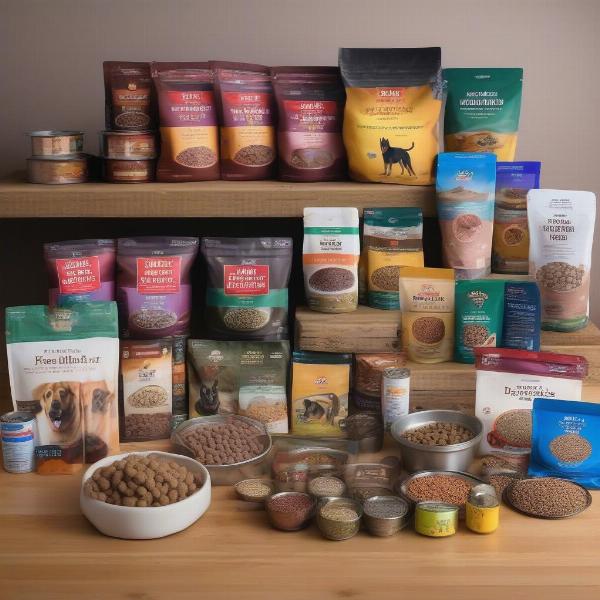Choosing the right dog food is crucial for your German Shepherd’s health and well-being. A proper diet fuels their active lifestyle, supports their strong build, and promotes a shiny coat and healthy skin. Finding the best dog food for a German Shepherd can be challenging with so many options available. This article will guide you through the key factors to consider, helping you make an informed decision for your furry companion.
Nutritional Needs of a German Shepherd
German Shepherds are large, energetic dogs prone to certain health issues like hip and elbow dysplasia, bloat, and sensitive stomachs. Their diet should be tailored to their specific needs, providing optimal nutrition for growth, development, and overall health. Key nutrients to look for include:
- High-quality protein: Essential for building and maintaining muscle mass. Look for animal-based protein sources like chicken, beef, lamb, or fish.
- Healthy fats: Support skin and coat health, provide energy, and aid in nutrient absorption. Sources like fish oil (rich in omega-3 fatty acids) are particularly beneficial.
- Carbohydrates: Provide a source of energy. Choose complex carbohydrates over simple sugars.
- Fiber: Aids in digestion and can help prevent bloat.
- Vitamins and minerals: Support overall health and immune function.
Choosing the Right Food Type
Several types of dog food are available, including dry kibble, wet food, and raw diets. Each has its pros and cons:
- Dry kibble: Convenient, affordable, and good for dental health.
- Wet food: More palatable for picky eaters and can be beneficial for dogs who need extra hydration.
- Raw diets: Controversial and require careful preparation to avoid nutritional imbalances and bacterial contamination. Consult with a veterinarian before considering a raw diet.
Best Dog Food Options for German Shepherds
Here are some top recommendations for German Shepherd dog food:
- Royal Canin German Shepherd Adult Dry Dog Food: Formulated specifically for the breed, addressing their unique nutritional needs.
- Purina Pro Plan Large Breed Adult Dry Dog Food: Provides optimal nutrition for large, active dogs like German Shepherds.
- Eukanuba Adult Large Breed Dry Dog Food: Supports joint health and muscle development.
- Hill’s Science Diet Adult Large Breed Dry Dog Food: A good option for dogs with sensitive stomachs.
 Various types of dog food for a German Shepherd
Various types of dog food for a German Shepherd
What to Avoid in German Shepherd Food
Certain ingredients can be harmful or less beneficial for German Shepherds. These include:
- Fillers: Low-quality ingredients like corn, wheat, and soy provide little nutritional value.
- Artificial colors, flavors, and preservatives: Can trigger allergies or sensitivities.
- By-products: Low-quality animal parts that are less digestible.
Feeding Schedule and Portion Control
How much and how often you feed your German Shepherd will depend on their age, activity level, and individual metabolism. Consult with your veterinarian to determine the appropriate feeding schedule and portion sizes for your dog. Overfeeding can lead to obesity, while underfeeding can result in nutritional deficiencies.
What if my German Shepherd has allergies?
best dog food for german shepherds with sensitive stomachs
Many German Shepherds suffer from food allergies. Common allergens include beef, chicken, dairy, and wheat. If you suspect your German Shepherd has a food allergy, consult with your veterinarian. They can perform tests to identify the allergen and recommend a hypoallergenic diet.
Switching to a New Food
When switching to a new food, do it gradually over several days to avoid digestive upset. Start by mixing a small amount of the new food with the old food and gradually increase the proportion of new food until the transition is complete.
Conclusion
Choosing the best dog food for a German Shepherd is an important decision that impacts their overall health and well-being. By considering their specific nutritional needs, choosing high-quality ingredients, and monitoring their weight and health, you can ensure your German Shepherd receives the optimal nutrition they need to thrive. Remember to consult your veterinarian for personalized recommendations.
FAQ
- How often should I feed my adult German Shepherd? Most adult German Shepherds should be fed twice a day.
- What is the best protein source for a German Shepherd? High-quality animal-based protein sources like chicken, beef, lamb, or fish are excellent choices.
- Can I feed my German Shepherd a raw diet? Raw diets are controversial and require careful planning. Consult with your veterinarian.
- What are signs of a food allergy in German Shepherds? Itching, skin irritation, digestive upset, and ear infections can be signs of food allergies.
- How do I switch my German Shepherd to a new food? Gradually transition over several days to avoid digestive problems.
- What is bloat, and why is it dangerous for German Shepherds? Bloat is a life-threatening condition where the stomach twists, cutting off blood supply. German Shepherds are a breed predisposed to bloat.
- What should I look for in a high-quality German Shepherd dog food? Look for animal-based protein as the first ingredient, avoid fillers, artificial ingredients, and by-products.
Related Articles:
- best dog food for german shepherd puppies
- best dog food german shepherd
- royal canin canned dog food
- dog charity xmas cards
ILM Dog is a leading international website dedicated to providing expert advice and resources on dog care and nutrition. We cover a wide range of topics, from breed selection and health care to training and behavior. Our team of experienced writers and dog experts is committed to offering accurate, practical, and up-to-date information to help dog owners worldwide provide the best possible care for their furry companions. Contact us today for expert advice and support. Email: [email protected], Phone: +44 20-3965-8624. Visit ILM Dog for more valuable insights on dog care.